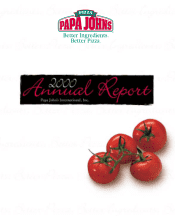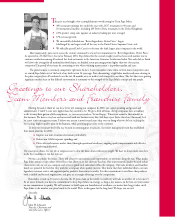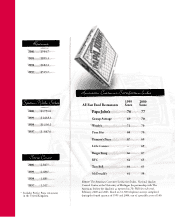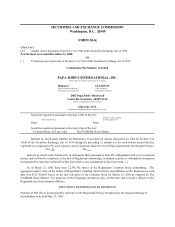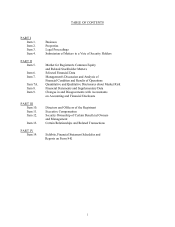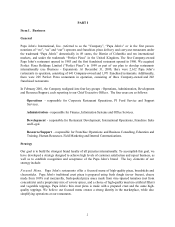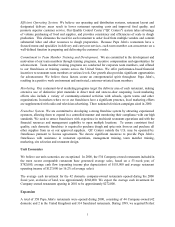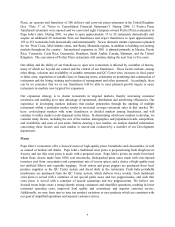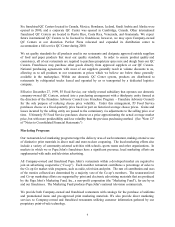Papa Johns 2000 Annual Report Download - page 8
Download and view the complete annual report
Please find page 8 of the 2000 Papa Johns annual report below. You can navigate through the pages in the report by either clicking on the pages listed below, or by using the keyword search tool below to find specific information within the annual report.3
Efficient Operating System. We believe our operating and distribution systems, restaurant layout and
designated delivery areas result in lower restaurant operating costs and improved food quality, and
promote superior customer service. Our Quality Control Center ("QC Centers") system takes advantage
of volume purchasing of food and supplies, and provides consistency and efficiencies of scale in dough
production. This eliminates the need for each restaurant to order food from multiple vendors and commit
substantial labor and other resources to dough preparation. Because Papa John’ s restaurants have a
focused menu and specialize in delivery and carry-out services, each team member can concentrate on a
well-defined function in preparing and delivering the customer’ s order.
Commitment to Team Member Training and Development. We are committed to the development and
motivation of our team members through training programs, incentive compensation and opportunities for
advancement. Team member training programs are conducted for corporate team members, and offered
to our franchisees at training centers across the United States. We offer performance-based financial
incentives to restaurant team members at various levels. Our growth also provides significant opportunities
for advancement. We believe these factors create an entrepreneurial spirit throughout Papa John’ s,
resulting in a positive work environment and motivated, customer-oriented team members.
Marketing. Our restaurant-level marketing programs target the delivery area of each restaurant, making
extensive use of distinctive print materials in direct mail and store-to-door couponing. Local marketing
efforts also include a variety of community-oriented activities with schools, sports teams and other
organizations. In markets where we or our franchisees have a significant presence, local marketing efforts
are supplemented with radio and television advertising. Three national television campaigns aired in 2000.
Franchise System. We are committed to developing a strong franchise system by attracting experienced
operators, allowing them to expand in a controlled manner and monitoring their compliance with our high
standards. We seek to attract franchisees with experience in multi-unit restaurant operations and with the
financial resources and management capability to open multiple locations. To ensure consistent food
quality, each domestic franchisee is required to purchase dough and spice mix from us and purchase all
other supplies from us or our approved suppliers. QC Centers outside the U.S. may be operated by
franchisees pursuant to license agreements. We devote significant resources to provide Papa John’ s
franchisees with assistance in restaurant operations, management training, team member training,
marketing, site selection and restaurant design.
Unit Economics
We believe our unit economics are exceptional. In 2000, the 534 Company-owned restaurants included in
the most recent comparable restaurant base generated average sales, based on a 53-week year, of
$782,000, average cash flow (operating income plus depreciation) of $155,000 and average restaurant
operating income of $127,000 (or 16.2% of average sales).
The average cash investment for the 42 domestic company-owned restaurants opened during the 2000
fiscal year, exclusive of land, was approximately $268,000. We expect the average cash investment for
Company-owned restaurants opening in 2001 to be approximately $272,000.
Expansion
A total of 358 Papa John’ s restaurants were opened during 2000, consisting of 44 Company-owned (42
domestic and 2 in the United Kingdom) and 314 franchised restaurants. During 1999, we acquired Perfect

